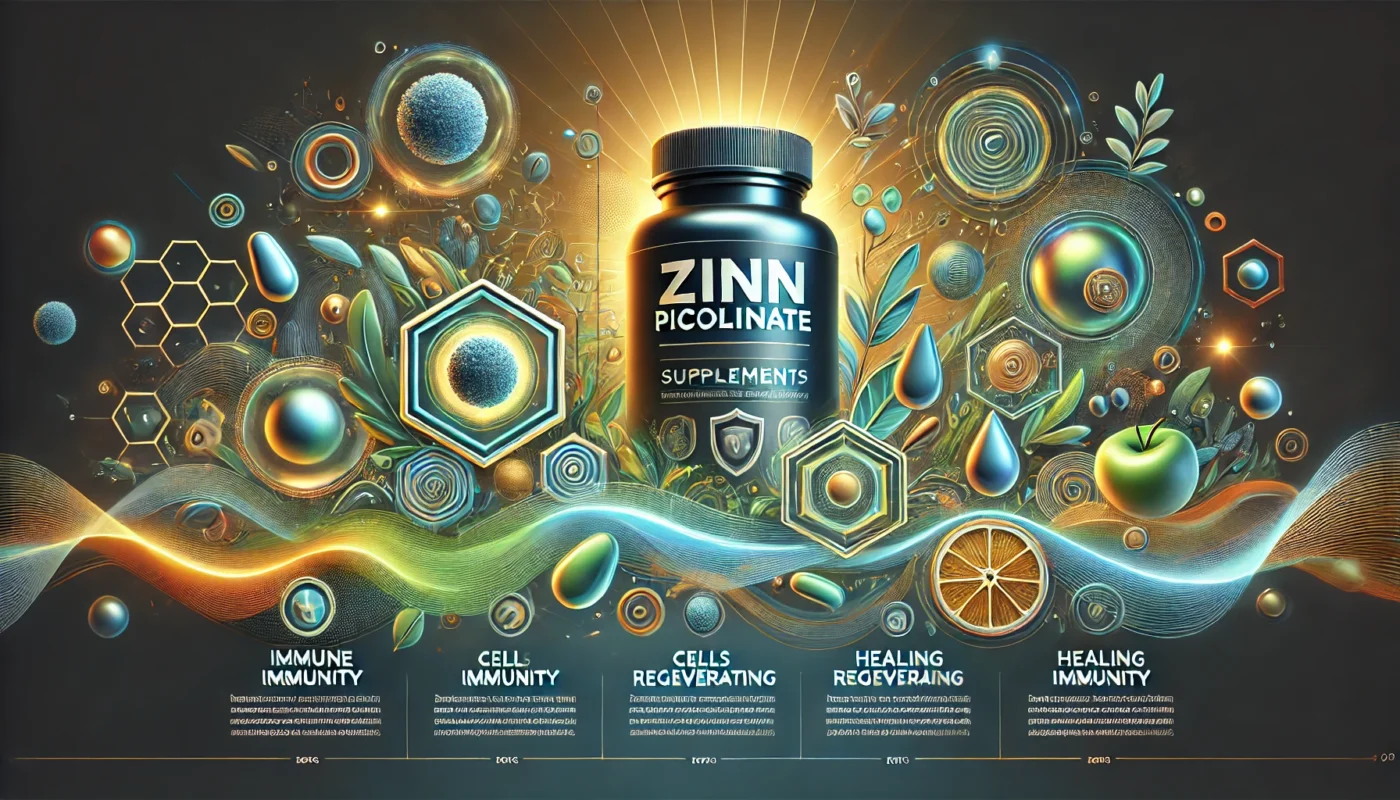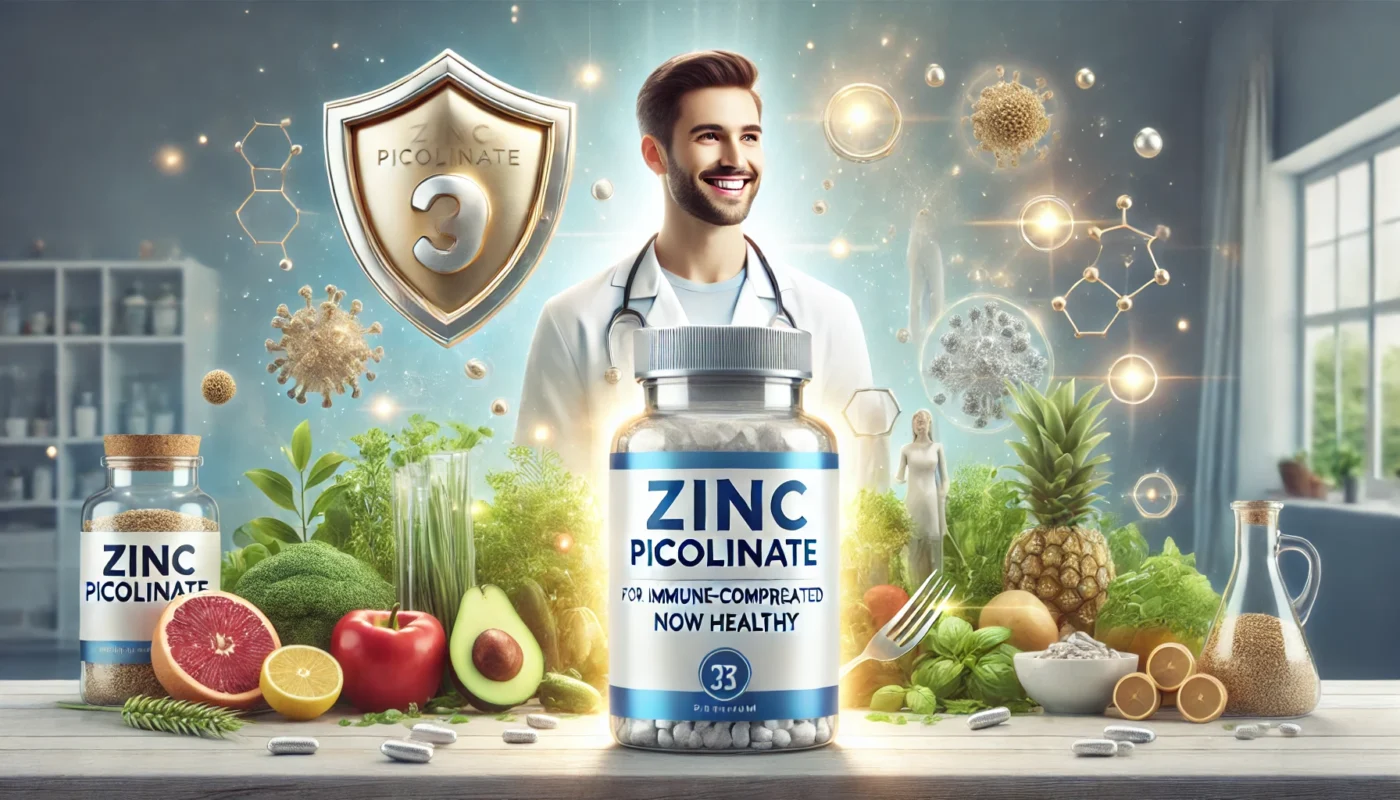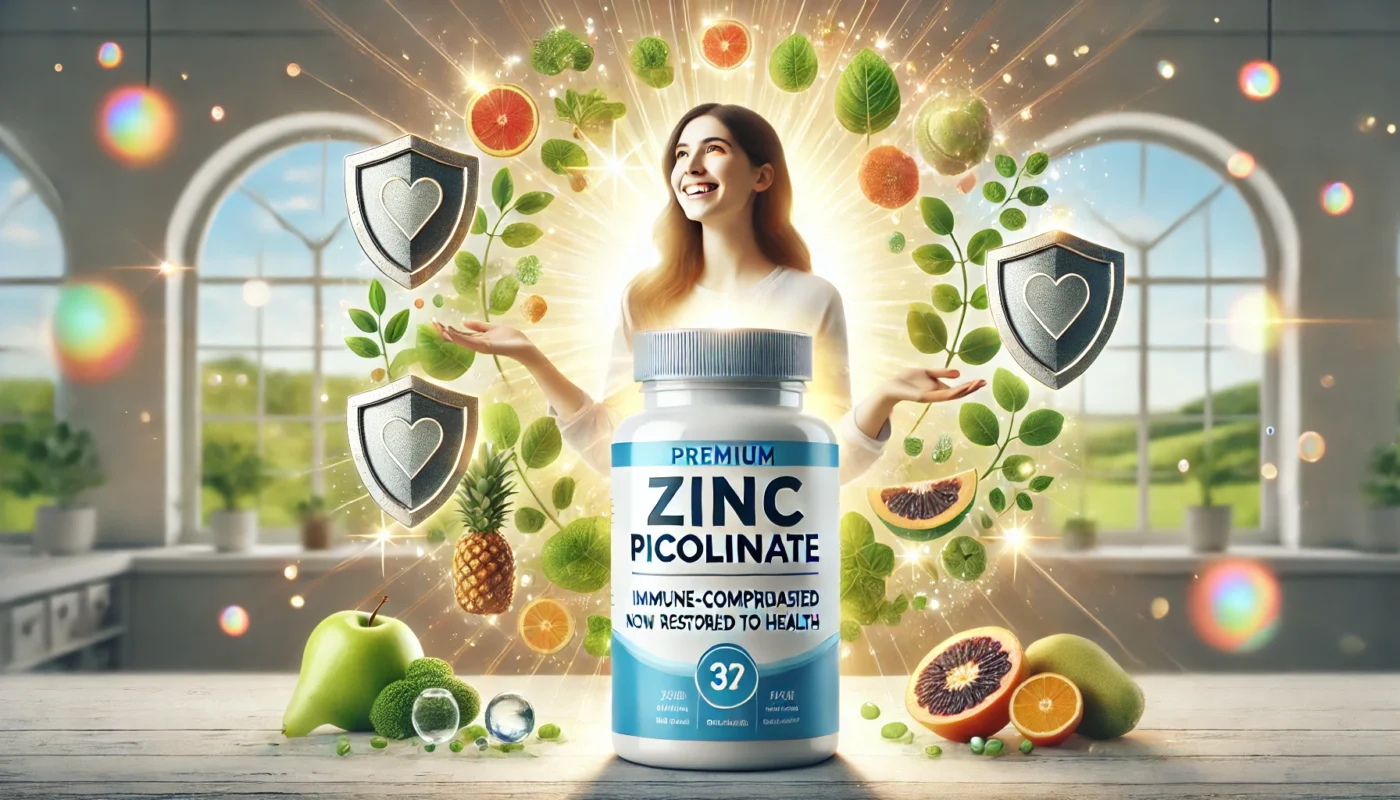The immune system is the body’s defense against infections, illnesses, and harmful pathogens. For individuals with compromised immunity—due to chronic illness, aging, or medical treatments—maintaining a strong and responsive immune system is critical. While a balanced diet, proper rest, and regular exercise contribute to immune health, specific nutrients play pivotal roles in enhancing immune function. Among these, zinc stands out as an essential trace mineral with profound effects on immunity.
Zinc Picolinate for Immune-Compromised Individuals: What Do You Need to Know? is an original (HSLHealing) article.
Zinc picolinate, a highly absorbable form of zinc, offers a reliable solution for individuals seeking to boost their immune defenses. This article explores how zinc picolinate supports immune-compromised individuals by enhancing immune cell function, reducing inflammation, and protecting against infections.
You May Also Like:
Zinc Picolinate for Immune Support in Cancer Patients: What Science Says
Zinc Picolinate for Immune Boosting in Chronic Illness: A Natural Approach
Understanding Compromised Immunity
Immune-compromised individuals have weakened or impaired immune systems, leaving them vulnerable to infections and other health complications. Common causes include:
- Chronic Illnesses:
Conditions such as diabetes, HIV/AIDS, and autoimmune diseases can suppress immune function. - Aging:
The immune system naturally declines with age, a phenomenon known as immunosenescence. - Medical Treatments:
Chemotherapy, radiation therapy, and immunosuppressive drugs for transplants can weaken immunity. - Nutritional Deficiencies:
Inadequate intake of immune-supporting nutrients, such as zinc, can impair immune response.
Why Zinc Is Critical for Immune Health
Zinc is involved in nearly every aspect of immune function, including:
- Immune Cell Development and Function:
Zinc is essential for the growth and activity of T-cells, B-cells, and natural killer (NK) cells, which play key roles in adaptive and innate immunity. - Antioxidant Protection:
Zinc neutralizes free radicals, preventing oxidative stress that can damage immune cells. - Inflammation Regulation:
Zinc modulates inflammatory cytokines, preventing excessive inflammation that can harm tissues. - Barrier Function:
Zinc strengthens epithelial cells, which form protective barriers in the skin, respiratory tract, and gastrointestinal tract. - Antimicrobial Activity:
Zinc directly inhibits the growth of certain pathogens, reducing the risk of infection.

What Is Zinc Picolinate?
Zinc picolinate is a chelated form of zinc, where zinc is bound to picolinic acid. This form enhances zinc absorption in the gastrointestinal tract, making it one of the most bioavailable forms of zinc supplementation. For immune-compromised individuals, zinc picolinate ensures efficient delivery of zinc to immune cells, supporting optimal function.
How Zinc Picolinate Supports Immune-Compromised Individuals
1. Enhancing T-Cell Function
T-cells are a cornerstone of adaptive immunity, identifying and destroying infected or cancerous cells. Zinc picolinate supports T-cell production and activity, ensuring a robust immune response.
- Study Insight: Research in American Journal of Clinical Nutrition found that zinc supplementation improved T-cell function by 35% in elderly individuals with weakened immunity.
2. Reducing Inflammation
While inflammation is a natural response to infection, chronic inflammation can damage tissues and weaken the immune system. Zinc picolinate modulates inflammatory cytokines like interleukin-6 (IL-6) and tumor necrosis factor-alpha (TNF-α).
- Clinical Evidence: A study in Nutrients reported that zinc supplementation reduced markers of chronic inflammation by 25% in individuals with autoimmune conditions.
3. Supporting Antioxidant Defenses
Immune-compromised individuals often experience elevated oxidative stress, which impairs immune cell function. Zinc picolinate boosts antioxidant enzymes like superoxide dismutase (SOD), protecting immune cells from damage.
- Research Finding: A study in Free Radical Biology and Medicine demonstrated that zinc supplementation increased antioxidant activity by 30%, reducing oxidative stress in patients with chronic illnesses.
4. Strengthening Barrier Integrity
The body’s physical barriers, such as the skin and mucosal lining of the respiratory and digestive tracts, are the first lines of defense against pathogens. Zinc picolinate maintains the integrity of these barriers, reducing infection risk.
- Evidence: Research in Journal of Clinical Immunology showed that zinc supplementation improved epithelial cell function in patients with compromised immune barriers, reducing the incidence of infections by 20%.
5. Combating Opportunistic Infections
Immune-compromised individuals are prone to opportunistic infections caused by bacteria, viruses, and fungi. Zinc picolinate enhances immune surveillance and response to such pathogens.
- Study Insight: A study in Journal of Infectious Diseases found that zinc reduced the severity and duration of respiratory infections by 33% in individuals with weakened immunity.
6. Supporting Recovery from Medical Treatments
Chemotherapy and radiation therapy can severely weaken the immune system. Zinc picolinate aids recovery by promoting cell repair and boosting immune function.
- Clinical Evidence: Research in Cancer Treatment Reviews highlighted that zinc supplementation improved recovery times and reduced infection rates in patients undergoing cancer treatments.

Zinc Deficiency and Its Impact on Immunity
Zinc deficiency is a common issue among immune-compromised individuals, exacerbating their vulnerability to infections and illnesses.
Symptoms of Zinc Deficiency in Immune-Compromised Individuals:
- Frequent or prolonged infections
- Delayed wound healing
- Chronic inflammation
- Fatigue and reduced energy levels
Statistics:
- A study in The Lancet found that 25% of individuals with chronic illnesses had zinc deficiency, correlating with a higher risk of infections and slower recovery.
Dietary Sources of Zinc
While supplementation with zinc picolinate is effective, incorporating zinc-rich foods into the diet can also support immunity. Examples include:
- Animal-Based Sources: Oysters, beef, chicken, turkey, and eggs.
- Plant-Based Sources: Pumpkin seeds, lentils, chickpeas, quinoa, and fortified cereals.
For individuals with dietary restrictions or absorption challenges, zinc picolinate offers a reliable and efficient alternative.
Recommended Dosage and Safety
The recommended dietary allowance (RDA) for zinc is:
- Adult men: 11 mg/day
- Adult women: 8 mg/day
For immune-compromised individuals, therapeutic doses of zinc picolinate typically range from 20–40 mg/day. Excessive zinc intake (above 40 mg/day) can cause:
- Nausea
- Reduced copper absorption
- Gastrointestinal discomfort
Note: Always consult with a healthcare provider before starting supplementation to determine the appropriate dosage and ensure safety.

Integrating Zinc Picolinate into an Immune Support Plan
- Take with Meals: Zinc picolinate is best absorbed when taken with food, particularly meals rich in protein.
- Combine with Other Immune-Supporting Nutrients: Pair zinc picolinate with vitamin C, vitamin D, and selenium for comprehensive immune support.
- Monitor Immune Health: Track improvements in infection frequency, energy levels, and recovery times after starting supplementation.
- Stay Hydrated: Proper hydration supports nutrient metabolism and immune function.
Who Can Benefit from Zinc Picolinate for Immunity?
- Individuals with Chronic Illnesses: Zinc picolinate strengthens immune defenses against frequent infections.
- Older Adults: Zinc supports immunity and combats age-related immune decline.
- Patients Undergoing Medical Treatments: Zinc aids recovery from chemotherapy, radiation, or surgery.
- Individuals Prone to Infections: Zinc picolinate reduces susceptibility to opportunistic infections.
Future Research Directions
While current studies highlight zinc picolinate’s benefits, future research could explore:
- Its long-term effects on immunity in patients with chronic illnesses.
- Synergistic benefits with other immune-supporting supplements, such as probiotics or curcumin.
- Zinc’s role in reducing antibiotic resistance in recurrent infections.
Conclusion: Zinc Picolinate for Immune-Compromised Individuals
Zinc picolinate offers a powerful, science-backed solution for strengthening immunity in individuals with compromised health. By enhancing immune cell function, reducing inflammation, and protecting against infections, zinc picolinate provides critical support for those most vulnerable to illnesses.
For individuals seeking to improve their immune resilience and overall health, incorporating zinc picolinate into a comprehensive wellness plan is a practical and effective choice. As always, consult with a healthcare provider to tailor supplementation to your specific needs and ensure safe and effective use.

References
- The Role of Zinc in Antiviral Immunity. Retrieved from: https://pmc.ncbi.nlm.nih.gov/articles/PMC6628855/
- Antibacterial and Antiviral Effects of Ag, Cu and Zn Metals, Respective Nanoparticles and Filter Materials Thereof against Coronavirus SARS-CoV-2 and Influenza A Virus. Retrieved from: https://www.mdpi.com/1999-4923/14/12/2549
- A Review of Micronutrients and the Immune System–Working in Harmony to Reduce the Risk of Infection. Retrieved from: https://pmc.ncbi.nlm.nih.gov/articles/PMC7019735/
- The Role of Zinc in Antiviral Immunity. Retrieved from: https://pubmed.ncbi.nlm.nih.gov/31305906/
- Haase, H., & Rink, L. (2014). Zinc and Oxidative Stress: Current Mechanisms. Nutrients.Retrieved from: https://pmc.ncbi.nlm.nih.gov/
Important Note: The information contained in this article is for general informational purposes only, and should not be construed as health or medical advice, nor is it intended to diagnose, prevent, treat, or cure any disease or health condition. Before embarking on any diet, fitness regimen, or program of nutritional supplementation, it is advisable to consult your healthcare professional in order to determine its safety and probable efficacy in terms of your individual state of health.
Regarding Nutritional Supplements Or Other Non-Prescription Health Products: If any nutritional supplements or other non-prescription health products are mentioned in the foregoing article, any claims or statements made about them have not been evaluated by the U.S. Food and Drug Administration, and such nutritional supplements or other health products are not intended to diagnose, treat, cure, or prevent any disease.

